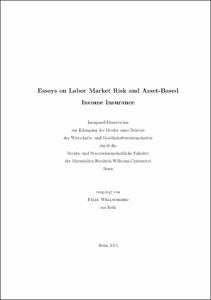Essays on Labor Market Risk and Asset-Based Income Insurance

Essays on Labor Market Risk and Asset-Based Income Insurance

| dc.contributor.advisor | Gehrig-Merz, Monika | |
| dc.contributor.author | Wellschmied, Felix | |
| dc.date.accessioned | 2020-04-19T14:44:59Z | |
| dc.date.available | 2020-04-19T14:44:59Z | |
| dc.date.issued | 27.05.2014 | |
| dc.identifier.uri | https://hdl.handle.net/20.500.11811/5954 | |
| dc.description.abstract | This dissertation contributes to the understanding of wage risk and its implication for the macroeconomy. The first chapter links differences in unemployment risk between countries to differences in product market regulation. I think of unemployment risk arising from search frictions in the labor market. For workers and vacant jobs it takes time matching in the market. I think of product market regulations as the costs firms have to pay to start operating. I show that these costs reduce firm entry; thereby, they lower the amount of new vacancies firms post and decrease the chance for the unemployed to find a new job. This effect turns out to be particular strong in countries with high unemployment benefits and labor taxation. The second chapter decomposes wage inequality into worker differences present at labor market entry, wage shocks occurring during working life, and search frictions. Our results challenge the common view that these frictions explain most of wage inequality among observationally similar workers. Our key novelty is introducing non value improving job to job transitions into an otherwise standard search framework. Using micro data for workers, we show that these are an important phenomenon. In total, our study attributes less than 18 percent of total wage inequality in the US to the presence of the search friction. The third chapter addresses how the government should insure households against labor market risk. In the presence of incomplete financial markets, the labor market risk affects households’ consumption; hence, their welfare. In the US, the government pays income transfers only to households with low wealth. The chapter compares the welfare implications of this transfer program with one which keeps total governmental expenditures constant, but uses no such asset means-test. I find that an unborn household prefers living under the policy without the means-test. The reason is that households with low innate ability save little in response to the means-test; therefore, they miss private means of self-insurance against labor market risk and fail building up sufficient wealth to keep up consumption during retirement. | en |
| dc.language.iso | eng | |
| dc.rights | In Copyright | |
| dc.rights.uri | http://rightsstatements.org/vocab/InC/1.0/ | |
| dc.subject.ddc | 330 Wirtschaft | |
| dc.title | Essays on Labor Market Risk and Asset-Based Income Insurance | |
| dc.type | Dissertation oder Habilitation | |
| dc.publisher.name | Universitäts- und Landesbibliothek Bonn | |
| dc.publisher.location | Bonn | |
| dc.rights.accessRights | openAccess | |
| dc.identifier.urn | https://nbn-resolving.org/urn:nbn:de:hbz:5-36133 | |
| ulbbn.pubtype | Erstveröffentlichung | |
| ulbbnediss.affiliation.name | Rheinische Friedrich-Wilhelms-Universität Bonn | |
| ulbbnediss.affiliation.location | Bonn | |
| ulbbnediss.thesis.level | Dissertation | |
| ulbbnediss.dissID | 3613 | |
| ulbbnediss.date.accepted | 12.08.2013 | |
| ulbbnediss.institute | Rechts- und Staatswissenschaftliche Fakultät / Fachbereich Wirtschaftswissenschaften : Institut für Makroökonomik und Ökonometrie | |
| ulbbnediss.fakultaet | Rechts- und Staatswissenschaftliche Fakultät | |
| dc.contributor.coReferee | Kuhn, Moritz |
Dateien zu dieser Ressource
Das Dokument erscheint in:
-
E-Dissertationen (288)




